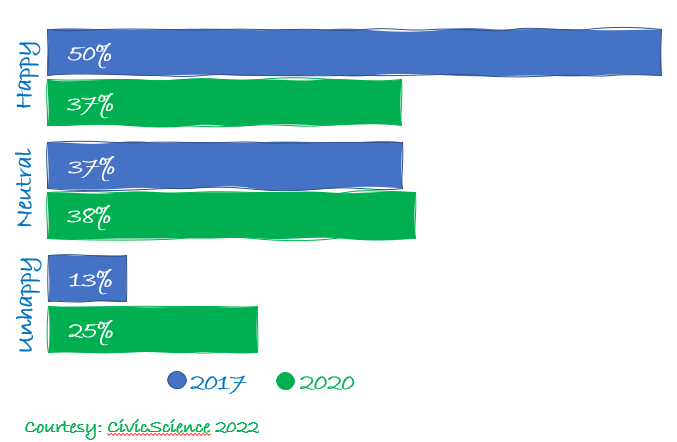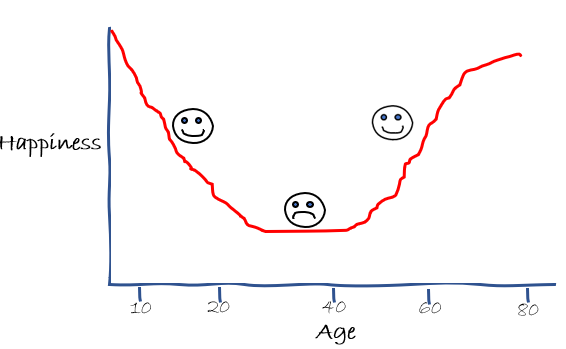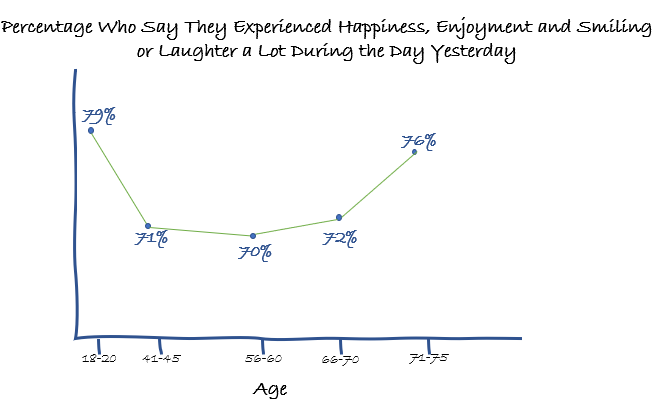How to Build a Happy Life in Six Easy Steps
A recent survey suggests that the happiness of today’s young adults has crashed over the last few years. So, what’s making the kids so unhappy?
Bestselling author and Professor Scott Galloway has some answers. Galloway is a very salty Professor of Marketing at NYU/Stern School of business. (Think: Larry David)
According to Galloway, young adults are stressed. It’s partially a function of how we’ve raised them. Many grew up hearing how “special” they were. And, how they should follow their “passion” and chase their “dreams”
It turns out that most kids aren’t really special. And, following their “passion” is a fast-track to a lifetime of making caramel macchiatos at Starbucks. Because no matter how special your kid may seem, they aren’t likely to be the next Tom Brady or Taylor Swift. As my brutally honest dad used to say to me: “son, lucky for you, the world always needs more ditch diggers.”
Photo by Tom Greene
The problem is that parents are not always the best judge of how special their kids really are. Everybody sees their own children as a reflection of their own wants, needs, desires and regrets. And, too often, we try to encourage our children to be more like us - or at least more like we see ourselves. After all, we made them. It’s the least they can do.
Lawnmower Parenting
We no longer helicopter parent. Today’s parents are more like a lawnmowers. While the helicopter parent observes obstacles from above, the lawnmower parent mows them down before the child even sniffs the obstacle. By removing any possibility of fear or failure from our kids lives we’ve created a generation of kids lacking any measure of resilience. Thus, the slightest obstacle or disappointment looks and feels cataclysmic to young adults. That’s making life hard for them.
Professor Galloway shares these and other thoughts in his book, The Algebra of Happiness: Notes on the Pursuit of Success, Love, and Meaning. He offers hard-hitting answers to life’s biggest questions:
What's the formula for a life well lived?
How can you have a meaningful career, not just a lucrative one?
Is work/life balance possible
What are the elements of a successful relationship?
So, what’s making the young adults so darn angsty? The simple truth is that our happiness peaks at around 18-20 years old. It declines every year until we reach our mid 50’s.
So what’s the cause of the long, slow slide to melancholia? According to Galloway, “real-life” is a lot more challenging than the four’ish years of free beer and cheap sex in college. As a result, the euphoria experienced in the early years begins to wane.
In their mid-20’s kids start to realize that mom and dad were F.O.S. They begin to realize that they aren’t special and can’t really do anything they set their mind to. As a result, their 20’s can seem like a let down.
That let down is leading to some major sociological trends, namely delayed adulthood. The irony of that delayed adulthood is that once the happiness starts to slide in your early twenties, it doesn’t return until your mid-70’s. So delaying adulthood only serves to delay the return of happiness. Kinda depressing, huh?
In our 40’s, most people begin to realize that life is pretty good, even if they aren’t Taylor or Tom. And, those with a spiritual foundation seem to reach this nirvana sooner than others. We begin to recognize our blessings and acknowledge our own mortality. We practice a little more gratitude over what we have and hold. Our happiness slide begins to bottom out. We start a steep climb out of the pit of despair and realize that life’s not so bad after all.
Professor Galloway opines that there are a few indicators of who will be happy and who will continue to wallow in the pit of despair as they age. Here they are:
Sweating vs. Watching People Sweat
There is a direct correlation between sweating and watching people sweat on television.
That is, those who go into the gym or practice some other form of regular exercise are happier than those who don’t. And, more importantly, Galloway suggests that the ratio of time spent sweating vs. watching others sweat is a forward looking indicator of your success.
“Show me a guy that spends weeknights watching ESPN and all day Sunday watching professional football and I’ll show you a guy headed for a lifetime of anger and failed relationships. Show me somebody who sweats every day and spends as much time sweating as he does watching others sweat on TV and I’ll show you someone who is good at life.”
“Overnight Success”
If you wanna be in the top 10% of wage earners in the second half of life, you have to plan to spend the first 10-20 years of your career working hard, very hard. Those years include lots of sacrifice, hard work, disappointment, late nights, etc.
That grinding during your younger years pays off later in life once your credentials are established. See, those who establish their credentials and find some financial security in the form of savings and equity will ultimately enjoy a great deal of freedom in the second half of life.
It’s true that money can buy happiness, but only to a certain point. But, most people don’t regret investing in themselves and their careers early for the trade off of time and security later in life. Especially when compound interest starts to kick in.
Did you know that you can get all my articles in audio format via Spotify, Apple iTunes, iHeart Radio and all other major podcast platforms?
Partnership/Marriage
As we’ve all heard before, the most important decision in life is who you choose to partner with. Those who derive their happiness from their home life are happier than those who make lots of money and are lonely. If a spouse isn’t a true partner, that can lead to extreme unhappiness. Choose wisely.
According to Galloway there is a simple formula to relationships.
It takes a mutual attraction. But, it also takes an alignment of values. Those things like religion, children and politics. Then, of course, there must be an alignment as to the approach to money. In the proper proportions those things can add up to exponential pleasure and happiness.
Understanding Wealth
Being rich isn’t making a lot of money. Being rich is simply having your income exceed your expenses. No matter how much money you make, if your spending exceeds your income, you are poor.
Life is About Experiences
While many believe that money and things will lead to happiness, research shows that happier people invest in experiences. And, those who enjoy those experiences with their children fare better. A recognition of the finite nature of the amount of time our children are with us tends to focus the mind on spending that time wisely. You are much better off driving a ten year old Hyundai Sonata and taking your kids on a ten day vacation to Yellowstone in the summertime.
Booze:
In the world’s longest running study on happiness, Harvard university outlines the key ingredients to living a happy life. But, more importantly, it outlines the key ingredients to unhappiness. In eighty years of analysis there is one, single item that nearly guarantees to factor into all failed marriages, career failures and financial instability: alcohol. Drink in moderation.
Resilience:
If you live long enough and take a few risks in life, you will ultimately fail at something (maybe more than once). Success isn’t about avoiding failure, it’s about being resilient when failure happens. Economic instability can happen, but it usually passes quickly. Suck it up and get back on the horse.
That’s it. Just a few nuggets of wisdom for a lifetime of happiness. If you know some young adults trying to find the magic elixir to happiness pass this article along to them. Or, pick up a copy of Scott Galloway’s book here.
Know friends, family or colleagues who would benefit from straight talk on American culture and current events? Sign them up here, it’s free.
Thanks so much for reading.









